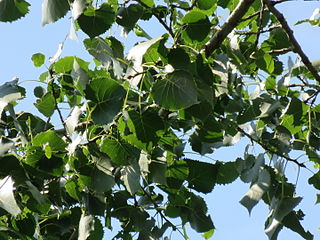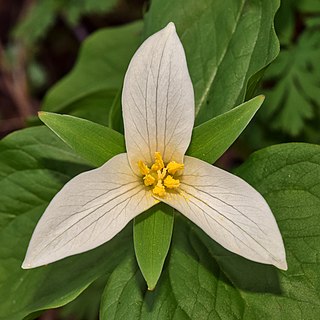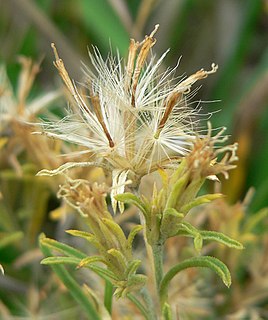
Pinus ponderosa, commonly known as the ponderosa pine, bull pine, blackjack pine, western yellow-pine, or filipinus pine is a very large pine tree species of variable habitat native to mountainous regions of western North America. It is the most widely distributed pine species in North America.

Eriophyllum lanatum, with the common names common woolly sunflower and Oregon sunshine, is a common, widespread, North American plant in the sunflower family.

Populus deltoides, the eastern cottonwood or necklace poplar, is a cottonwood poplar native to North America, growing throughout the eastern, central, and southwestern United States as well as the southern Canadian prairies, the southernmost part of eastern Canada, and northeastern Mexico.

Trillium ovatum, the Pacific trillium, also known as the western wakerobin, western white trillium, or western trillium, is a species of flowering plant in the family Melanthiaceae. It is found in western North America, from southern British Columbia and the tip of southwestern Alberta to central California, east to Idaho and western Montana. There is an isolated population in northern Colorado and southern Wyoming.

Ericameria nauseosa, commonly known as Chamisa, rubber rabbitbrush, and gray rabbitbrush, is a North American shrub in the sunflower family (Aster). It grows in the arid regions of western Canada, western United States and northern Mexico.

Pseudoroegneria spicata is a species of grass known by the common name bluebunch wheatgrass. This native western North American perennial bunchgrass is also known by the scientific synonyms Elymus spicatus and Agropyron spicatum. The grass can be found in the United States, Canada, and Mexico from Alaska and Yukon south as far as Sonora and Nuevo León.

Caltha leptosepala, the white marsh marigold, twinflowered marsh marigold, or broadleaved marsh marigold, is a perennial species of flowering plant in the buttercup family. It is native to western North America from Alaska to New Mexico, where it grows in wet mountain habitats in alpine and subalpine regions. There are two general wild types of this species, one native to the interior and one that grows along the Pacific coast and coastal mountains, but these are not always treated separately.

Lepidium montanum is a species of flowering plant in the mustard family known by the common names mountain pepperweed, mountain peppergrass, mountain pepperwort, and mountain pepperplant. It is native to western North America from Oregon to Montana to northern Mexico, where it can be found in a number of habitats, often on salty or gravelly soils. There are several varieties, many of which are difficult to distinguish.

Phacelia sericea, the silky phacelia or blue alpine phacelia, is a showy perennial species of Phacelia endemic to western North America. Uncommon, it grows mainly at subalpine to alpine elevations in forest openings or above treeline among rocks and sand. Sericea comes from the Latin sericeus, or silky, referring to the fine hairs on the leaves and stem.

Astragalus purshii is a species of milkvetch known by the common names woollypod milkvetch and Pursh's milkvetch.

Chrysothamnus viscidiflorus is a species of shrub in the daisy family of the Americas known by the common names yellow rabbitbrush and green rabbitbrush.

Glossopetalon spinescens, syn. Forsellesia spinescens, is a species of flowering shrub in the family Crossosomataceae known by the common names greasebush, spiny greasebush, Nevada greasewood and spring greasebush.

Leptosiphon nuttallii is a species of flowering plant in the phlox family known by the common name Nuttall's linanthus.

Sidalcea malviflora is a species of flowering plant in the mallow family, known by the common names dwarf checkerbloom, Greek mallow, prairie mallow and dwarf checkermallow.

Sidalcea oregana is a species of flowering plant in the mallow family known by the common name Oregon checkerbloom.

Artemisia cana is a species of sagebrush native to western and central North America, a member of the sunflower family. It is known by many common names, including silver sagebrush, sticky sagebrush, silver wormwood, hoary sagebrush, and dwarf sagebrush.

Atriplex gardneri is a species of flowering plant in the amaranth family known by the common name Gardner's saltbush. It is native to western North America from British Columbia to Saskatchewan in Canada south to Nevada and New Mexico in the United States. The specific epithet of the species, gardneri, is misnamed after its first collector, Alexander Gordon. The naturalist Alfred Moquin-Tandon was under the impression that Gordon's last name was Gardner.

Purshia glandulosa is a species of flowering plant in the rose family known by the common names antelope bitterbrush, desert bitterbrush, Mojave antelope brush.

Ericameria parryi is a species of flowering plant in the aster family known by the common name Parry's rabbitbrush. It is native to much of the western United States.



















